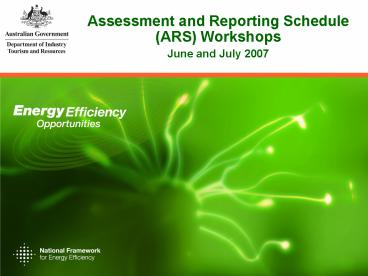Overview of Energy Efficiency Opportunities - PowerPoint PPT Presentation
1 / 30
Title:
Overview of Energy Efficiency Opportunities
Description:
Dragline. Energy Owner. Fuel Use. Equipment. 29. 29. 29 ... Dragline. Energy Owner. Fuel Use. Equipment. Existing projects (table 2.3) What projects to include ... – PowerPoint PPT presentation
Number of Views:35
Avg rating:3.0/5.0
Title: Overview of Energy Efficiency Opportunities
1
Assessment and Reporting Schedule (ARS)
WorkshopsJune and July 2007
2
Policy Objectives
- 2004 Energy White Paper under the National
Framework for Energy Efficiency
Aims Improve business productivity and
competitiveness Reduce greenhouse gas emissions
Reduce unnecessary demand on energy
infrastructure
3
Unlocking the potential
- Potential for energy efficiency has always been
high - Legislation requires large energy users to look
for cost effective opportunities to reduce energy
use - Integrate energy efficiency into your business
by
- Understanding where, how, and how much energy is
used (conducting assessments) - Giving due consideration to outcomes of
assessments (public reporting via the Board) - Look for synergies with existing business
activities
4
Participation by sector
No. of companies by sector
Percentage of energy use by sector
Note Based on estimated energy use supplied by
companies at registration. Not all companies
indicated exact energy use. Accurate energy use
not required at registration.
5
Who is participating and how much energy do they
use?
Participating businesses use over 60 of business
energy end use and around 45 of Australian
energy end use
Govt (1) Private (27) Other Business
(28) Energy Efficiency Opportunities (45)
219 approx
60
840 000 Businesses
Total business energy use
Australian Energy End Use
Australian businesses
6
Company Results to Date
- 4 Trial Companies 3 manufacturing sites 8
mining sites - Energy a large percentage of costs so already a
focus - Willing to give it best shot - try new approaches
build on existing ones. - Midland Brick energy savings 4-8, 5000
households, 19,000 tonnes CO2 - Orica site - 1 million savings
- Benefits gt Costs
- What might be the impact ? - if everyone takes
this approach
7
Broader Policy Context Emissions Trading
- Emissions Trading Scheme no later than 2012
- Market - least cost means to lowering emissions
- Energy efficiency appears to provide lowest cost
abatement opportunities net economic benefit - Some market barriers may reduce with introduction
of carbon price - Assessment Audit programs role to play in lead
up to ETS increasing awareness of energy savings
8
Program timeline
9
Assessment and Reporting Schedule key components
- Your Organisation
- Baseline energy and savings data
- Assessment Reporting When and How
- Permissions
10
Assessment and Reporting Schedule - Intent
- Flexible Appropriate
- Demonstrate understanding of intent
- Preparation Planning
- Measure Effectiveness
11
Workshop intent feedback
- This workshop is designed to
- support your participation in the program
- assist your understanding of the Assessment and
Reporting Schedule - assist your understanding of the program
reporting requirements - Your input feedback is important to us - thank
you !
12
Public reporting exercise
13
Public reporting when to report
14
Overview Assessment and Reporting Schedule (ARS)
15
Assessment and Reporting Schedule key
components
- Your Organisation Part 1
- Baseline energy and savings data Part 2
- Assessment When and How Part 3
- Reporting When and Where Part 4
- Permissions
16
Changes to the assessment and reporting template
- Better guidance and reference to the program's
legislation and guidelines - Better alignment of energy data within the
template and to public information - Reduced compliance costs
17
Assessment and Reporting Schedule Your
Organisation
- Your Organisation - Part 1
- Who - List and Diagram subsidiary or activity
- Nominations and authorisations
- Joint ventures and partnerships
- Changes
- ANZSIC codes moved to energy data
- Information on EEO website (optional)
- Location of sites gt .5PJ (optional)
18
Assessment and Reporting Schedule Baseline
Energy Data Part 2
- Baseline energy data Table 2.1
- Energy Use by energy type and indicator (2.1)
- ANZIC/GICS, Accuracy, (2.1),
- To be assessed not assessed (moved here)
- Existing energy efficiency opportunities Table
2.3 - Historical Energy Use (2.2) Energy Savings
(2.4) - Forecast Energy Use (taken out)
19
Assessment Schedule Part 3
- Assessment scheduling - Table 3.1
- Timing of assessments
- First assessments by 30 June 2008
- Flexibility to align with business needs
- How to conduct an assessment 3.2
- Pre planning for assessments
- Recognises existing systems
- Risk management
20
Reporting Schedule Part 4
- Reporting scheduling Table 4.1
- Where to report
- When to report
- Applications for permissions
- Energy use data less accurate than 5 percent
- Different conversion factors for energy use
- Reporting total energy use in bands
21
Topics to be covered today
- Your organisation and baseline energy data
- Describing how you will conduct assessments
- Reporting
- Managing changes in the assessment cycle
22
- Organisation and energy use baseline
23
Disaggregating company data
24
Disaggregating company data
25
Disaggregating company data
26
Accuracy
- Accuracy of energy data (table 2.1)
- /- 10 assessment and reporting schedule
- /- 5 assessments
27
Energy boundary rules
- Commercial buildings
- Tenants
- Landlords
- Mining sites
- Mine owners
- Mine contractors
28
Application Energy boundary rules
29
Application Energy boundary rules
30
Existing projects (table 2.3)
- What projects to include
- Net financial and energy benefits capital costs
and ongoing benefits































